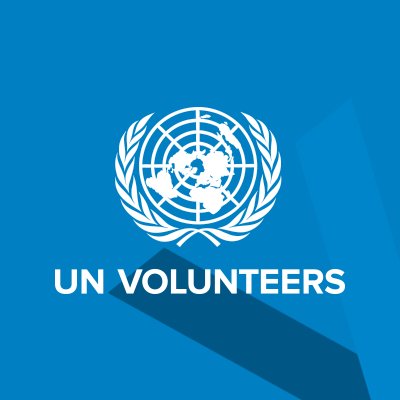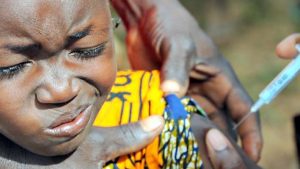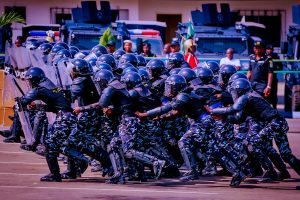Associate Information Management Officer at the United Nations Volunteers (UNV)

The United Nations Volunteers (UNV) programme is the UN organization that promotes volunteerism to support peace and development worldwide. Volunteerism can transform the pace and nature of development and it benefits both society at large and the individual volunteer.
We are recruiting to fill the position below:
Job Title: Associate Information Management Officer
Application Code: NGAR000070-4867
Location: Ogoja-Calabar, Cross River
Duration: 12 months
Expected Starting Date: Immediate
Assignment Place: Family Duty Station
Volunteer Category: International Specialist
Host Institute: UN High Commissioner for Refugees
Description
UNV contributes to peace and development by advocating for volunteerism globally, encouraging partners to integrate volunteerism into development programming, and mobilizing volunteers. In most cultures volunteerism is deeply embedded in long-established, ancient traditions of sharing and support within the communities.
In this context, UN Volunteers take part in various forms of volunteerism and play a role in development and peace together with co-workers, host agencies and local communities.In all assignments, UN Volunteers promote volunteerism through their action and conduct. Engaging in volunteer activity can effectively and positively enrich their understanding of local and social realities, as well as create a bridge between themselves and the people in their host community. This will make the time they spend as UN Volunteers even more rewarding and productive.
Assignment Details
Organizational Context & Project Description:
The Office of the UNHCR was established on 14 December 1950 by the UN General Assembly. The agency is mandated to lead and co-ordinate international action to protect refugees and resolve refugee problems worldwide. Its primary purpose is to safeguard the rights and well-being of refugees. It strives to ensure that everyone can exercise the right to seek asylum and find safe refuge in another State, with the option to return home voluntarily, integrate locally or to resettle in a third country (www.unhcr.org).
Following continued protests from the population in the English-speaking part of Cameroon, which started in October 2016, against marginalization, historic injustices, including the deployment of French speaking teachers to Southern Cameroon, over 35,700 officially registered refugees have fled into Nigeria for their safety. As the crisis in Cameroon’s South-West and North-West Anglophone regions continues, and the government in Yaoundé intensifies its actions against the pro-independent movement, the number of people crossing the border into neighbouring Nigeria is increasing. More Cameroonians are arriving through Cross River, Taraba and Benue States in South-South and Middle-Belt Nigeria. The steady influx of refugees into the country is putting more pressure on the refugee settlements that are now beyond capacity.
As a result, L2 emergency declared in February 2018, was further extended on 11th December 2018 until March 2019. Initially, UNHCR and its partners established office in Calabar, Ikom and Adikpo in order to ensure timely delivery of service. Effective 1st November 2018, the Ikom Field Office was moved to Ogoja for proximity to the point of delivery. Similarly, the Ogoja office has become the epicenter of UNHCR operation in the South-East Nigeria and has been upgraded to Sub Office due to the high concentration of refugee population.
UNHCR and the Government of Nigeria continue registration of Cameroonian refugees. The total of 35,700 Cameroonian refugees registered in Nigeria includes 26,984 in Cross River State; 4, 757 in Benue State, 3,360 in Taraba State and 506 in Akwa Ibom State. Meanwhile, 30,936 refugees have been verified through individual registration. UNHCR and the National Commission for Refugees, Migrants and Internally Displaced Persons continued registration and issuance of ID cards to Cameroonian refugees in Calabar, Anyake and Okende. UNHCR and the Government of Nigeria are working to develop more sites to decongest the settlements and relieve communities hosting refugees. Critical needs remain food, basic/domestic items and shelter.
Task Descriptions
Under the direct supervision of Senior Protection Officer, the UN Volunteer will undertake the following tasks:
- Assist in the implementation and operationalization of the country/operation-specific Information Management strategy.
- Operationalize country-specific common data standards and promote them with partners.
- Compile, aggregrate and analyze data and information elements required to produce standardized information products and implement data/information collection plans for baseline and contextspecific data.
- Support the operation in the analysis of processed data and information and perform data quality and consistency control.
- Train field staff on the use of data collection forms, how to enter data and how to analyze it. Also, train field staff on the protection of sensitive data, including both hardcopies and electronic data.
- Facilitate the analysis of cross-border information between relevant countries.
- Support and leverage geographic data for map production and use in geographic information systems (GIS).
- Share UNHCR data with partner agencies and maintain Portal population figures in-line with aggreed frequencies.
- Provide technical Information Management support to Needs Assessment processes, specifically in data collection, processing/collation and analysis.
Furthermore, UN Volunteers are required to:
- Strengthen their knowledge and understanding of the concept of volunteerism by reading relevant UNV and external publications and take active part in UNV activities (for instance in events that mark International Volunteer Day)
- Be acquainted with and build on traditional and/or local forms of volunteerism in the host country
- Provide annual and end of assignment reports on UN Volunteer actions, results and opportunities using UNV’s Volunteer Reporting ApplicationContribute articles/write-ups on field experiences and submit them for UNV publications/websites, newsletters, press releases, etc.
- Assist with the UNV Buddy Programme for newly-arrived UN VolunteersPromote or advise local groups in the use of online volunteering, or encourage relevant local individuals and organizations to use the UNV Online Volunteering service whenever technically possible.
Results/Expected Outputs
- The Office is able to implement its Information Management strategy which guides all IM activities in the country.
- The Office delivers reliable, accessible and user-friendly, relevant, predictable, appropriate and timely delivery of information.
- Global data standards, and where appropriate, the establishment of country-specific common data standards are adopted by UNHCR and its partners.
- The development of capacity through coaching, mentoring and formal on-the-job training, when working with (including supervising) national staff or (non-) governmental counter-parts, including Implementing Partners (IPs);
- Age, Gender and Diversity (AGD) perspective is systematically applied, integrated and documented in all activities throughout the assignment
- A final statement of achievements towards volunteerism for peace and development dur-ing the assignment, such as reporting on the number of volunteers mobilized, activities participated in and capacities developed
Qualifications/Requirements
Required Degree Level – Bachelor degree or equivalent:
Education – Additional Comments:
- Undergraduate degree (equivalent of a BA/BS) in Information Technology, Demography, Statistics, Social Sciences or any related area plus minimum 3 years of previous work experience relevant to the function OR Graduate degree (equivalent of a Master’s) plus 2 year.
Required experience – 36 months
Experience Remark:
- Knowledge of the UN system and the humanitarian community.
- Experience in the context of partnership building and consensual decision-making.
- Proven skills to analyze statistical information.
- Advanced Excel skills (e.g. pivot tables, functions, etc.).
- Ability to formulate IM-related technical requirements and Operating Procedures.
- Ability to compile and holistically analyze diverse datasets.
- Experience with handling confidential data and demonstrated understanding of different data collection methodologies.
- Excellent knowledge of English and UN working language of the duty station if not English.
Language Skills:
- English (Mandatory), Level – Fluent
Area of Expertise:
- Statistics Mandatory
Area of Expertise Requirement:
- Need Driving Licence – No
Competencies & Values:
- Accountability
- Adaptability and Flexibility
- Commitment to Continuous Learning
- Communication
- Planning and Organizing
- Professionalism
- Working in Teams
Conditions of Service and Other Information
Conditions of Service for International Specialist:
- The contract lasts for the period indicated above with possibility of extensions subject to availability of funding, operational necessity and satisfactory performance. However, there is no expectation of renewal of the assignment.
- A UN Volunteer receives a Volunteer Living Allowance (VLA) which is composed of the Monthly Living Allowance (MLA) and a Family Allowance (FA) for those with dependents (maximum three).
- The Volunteer Living Allowance (VLA) is paid at the end of each month to cover housing, utilities, transportation, communications and other basic needs. The VLA can be computed by applying the PostAdjustment Multiplier (PAM) to the VLA base rate of US$ 1,631. The VLA base rate is a global rate across the world, while the PAM is duty station/country-specific and fluctuates on a monthly basis according to the cost of living. This method ensures that international UN Volunteers have comparable purchasing power at all duty stations irrespective of varying costs of living. The PAM is established by the International Civil Service Commission (ICSC) and is published at the beginning of every month on the ICSC website http://icsc.un.org.
- For UN Volunteer entitlements, kindly refer to the link: https://vmam.unv.org/calculator/entitlements
- In non-family duty stations that belong to hardship categories D or E, as classified by the ICSC, international UN Volunteers receive a Well-Being Differential (WBD) on a monthly basis.
- Furthermore, UN Volunteers are provided a settling-in-grant (SIG) at the start of the assignment (if the volunteer did not reside in the duty station for at least 6 months prior to taking up the assignment) and in the event of a permanent reassignment to another duty station.
- UNV provides life, health, permanent disability insurances as well as assignment travel, annual leave, full integration in the UN security framework (including residential security reimbursements).
- UN Volunteers are paid Daily Subsistence Allowance at the UN rate for official travels, flight tickets for periodic home visit and for the final repatriation travel (if applicable). Resettlement allowance is paid for satisfactory service at the end of the assignment.
- UNV will provide, together with the offer of assignment, a copy of the Conditions of Service, including Code of conduct, to the successful candidate.
Supervision, induction and duty of care of UN Volunteers
UN Volunteers should be provided equal duty of care as extended to all host entity personnel. Host entity support to the UN Volunteer includes, but is not limited to:
- Introductory briefings about the organisation and office-related context including security, emergency procedures, good cultural practice and orientation to the local environment;
- Support with arrival administration including setting-up of bank accounts, residence permit applications and completion of other official processes as required by the host government or host entity;
- Structured guidance, mentoring and coaching by a supervisor including a clear workplan and performance appraisal;
- Access to office space, equipment, IT support and any other systems and tools required to complete the objectives of the assignment including a host entity email address;
- Access to shared host entity corporate knowledge, training and learning;
- Inclusion of the volunteer in emergency procedures such as evacuations;
- Leave management;
- DSA for official travel, when applicable;
- All changes in the Description of Assignment occurring between recruitment and arrival or during the assignment need to be formalized with the United Nations Volunteer Programme.
Living Conditions Living Conditions:
- The Federal Republic of Nigeria is a country on the coast of West Africa, bordered by Benin, Cameroon, Chad, and Niger. It has an estimated population of 186,9 million making it Africa’s most populous country and an area of 923,768 square kilometres. Capital city is Abuja located in the centre of the nation, while Maiduguri is the capital and the largest city of Borno State in north-eastern Nigeria. Spoken languages are English (official), Hausa, Fulani, and others. The prevailing climate in Maiduguri is known as a local steppe climate with little rainfall during the year. Temperatures are generally between 25 and 38 °C. Driest month is January, and May is warmest one.
- Security environment in the North East continues to be a cause of concern due to ongoing armed conflict between security forces and insurgents. Despite some recent gains by security forces, Boko Haram insurgent group remains resilient and continues to resort to asymmetrical warfare resulting in collateral damage among civilian population. UN Security Level-3 is currently in place in Maiduguri, and it is nonfamily duty station. This implies that official and private road travel by staff is limited as per the MOSS and all official missions in this region should not begin before 07:00 and be in a secure location no later than 18:30. Security escort is not required for travel within the city. However, police escorts are required as per MOSS for travel by road for most of the directions outside Maiduguri city. Most of the areas of responsibilities are accessible by UNHAS helicopters. Manual security clearance as well as TRIP system clearance should be obtained from UNDSS for all travels by road/air within North-East of Nigeria. Traveling from Maiduguri to major cities (Abuja, Lagos, Yola, etc.) can be on several UN cleared commercial air carriers, as well as UNHAS.
- UNHCR Maiduguri has a guest house for the international staff assigned, and for all other staff coming on mission. The guest house is the best so far in the city, and provides basic facilities namely TV, hot shower and a clean room. The Rest and Recuperation (R&R) cycle in Maiduguri is 6 weeks, with the designated place of R&R being Accra, Ghana.
- There is a UN Clinic in Maiduguri, and other UN recommended hospitals. Although these hospitals are not Assignment Title Assignment Title Associate Information Management Officer up to internationally acceptable standards; they provide basic health care services.
- The official currency is Nigerian Naira (NGN). Cash is the main means of transaction though cards are also accepted at some hotels and shops. You are encouraged to open local bank account. US dollars can be exchanged at hotels and banks, once you arrive in Maiduguri the driver can guide you on this. Below is to give you approximate idea of exchange rate in June 2019:
- UN Rate: 1 USD = 359.98 NGN
- Bank Rate: 1 USD = 371.00 NGN;
- Local Market Rate: 1 USD = 359.00 NGN
Application Closing Date
11th July, 2019.
The post Associate Information Management Officer at the United Nations Volunteers (UNV) appeared first on Jobs in Nigeria – http://jobsinnigeria.careers.







